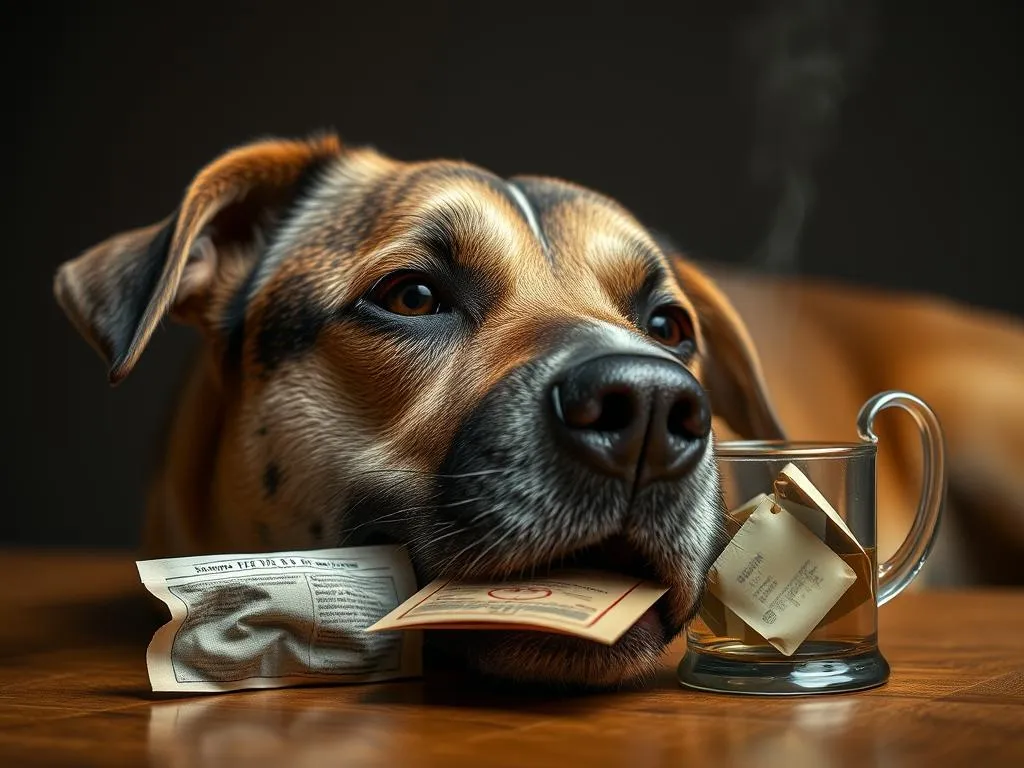
Introduction
It can be alarming when you discover that your dog has ingested something that isn’t food—especially when it comes to non-food items like tea bags. While dogs are naturally curious and often explore their environment with their mouths, not all items are safe for them to chew or swallow. Understanding the potential risks associated with tea bags is crucial for any pet owner. This article provides guidance on what to do if your dog has eaten tea bags and outlines the potential health risks involved.
Understanding the Risks
Common Substances in Tea Bags
Tea bags can contain various types of tea, including black, green, and herbal teas. Each type of tea has its unique ingredients and potential additives. For instance, black tea and green tea often contain caffeine, which can be harmful to dogs in significant amounts. Additionally, herbal teas may have a range of ingredients, some of which could be toxic to pets.
Many tea bags also include flavorings, sweeteners, and sometimes even essential oils, which can pose additional risks. Understanding what’s in the tea bag your dog consumed is essential for assessing the situation accurately.
Potential Toxicity
One of the primary concerns when a dog ingests tea bags is caffeine toxicity. Dogs are more sensitive to caffeine than humans, and even small amounts can lead to serious health issues. Symptoms of caffeine toxicity in dogs may include restlessness, rapid breathing, heart palpitations, and muscle tremors. In severe cases, it can lead to seizures or even death.
Beyond caffeine, some tea bags may contain non-caffeine ingredients that can be harmful. For example, artificial flavorings and sweeteners like xylitol are toxic to dogs and can cause symptoms ranging from gastrointestinal distress to liver failure.
Symptoms to Look Out For
If your dog has eaten a tea bag, it’s essential to monitor them closely. Common symptoms of toxicity include:
- Vomiting
- Diarrhea
- Lethargy
- Increased heart rate
- Restlessness
In more severe cases, symptoms may escalate to:
- Seizures
- Difficulty breathing
- Collapse
If you notice any of these symptoms, it’s crucial to act quickly and seek veterinary assistance.
Immediate Steps to Take
Assessing the Situation
First, determine how many tea bags your dog consumed and the type of tea involved. This information will be vital for your veterinarian in assessing the risk and deciding on the appropriate course of action. If possible, keep the packaging of the tea bags to provide clear information about the ingredients.
When to Contact a Veterinarian
It’s always better to err on the side of caution. If your dog has ingested tea bags, contact your veterinarian if:
- They exhibit any symptoms of toxicity.
- You are unsure about the type of tea or the quantity consumed.
- Your dog is small or has pre-existing health conditions.
When contacting your veterinarian, be prepared to provide details about the incident, including the type of tea consumed, the number of bags eaten, and any symptoms your dog is displaying.
Home Remedies (If Applicable)
In some cases, if your dog has ingested tea bags but shows no immediate symptoms, you may opt for home monitoring. Keep them hydrated and watch for any changes in behavior. However, do not administer any human medications without consulting your vet first, as some can be harmful to dogs.
What to Expect at the Vet
Diagnostic Procedures
When you take your dog to the vet, they may perform several diagnostic tests to assess your dog’s condition. These may include blood work to evaluate organ function and X-rays to check for any blockages in the gastrointestinal tract caused by the tea bags.
Providing accurate information about the ingestion incident will help your veterinarian make informed decisions about your dog’s treatment.
Treatment Options
If your dog has ingested tea bags, treatment options can vary based on the severity of the situation. Common treatments may include:
- Inducing vomiting: If the ingestion happened recently, your vet may induce vomiting to prevent further absorption of toxins.
- Activated charcoal: This may be administered to help absorb any remaining toxins in your dog’s system.
- Hospitalization: In more severe cases, your dog may need to be hospitalized for monitoring and supportive care, especially if they are showing significant symptoms.
Follow-up Care
After treatment, follow-up care is crucial. Your vet may recommend regular check-ups to monitor your dog’s recovery. Be vigilant for any signs of complications, such as changes in appetite, behavior, or bowel habits.
Preventive Measures
Training Your Dog
One of the best ways to prevent future incidents is through training. Teaching your dog to avoid eating non-food items can help keep them safe. Utilize positive reinforcement techniques, rewarding them for ignoring items they shouldn’t eat. Consistency is key, so work with them regularly.
Safe Storage of Household Items
Make a habit of storing tea bags and other potentially harmful items out of your dog’s reach. Consider using dog-proof containers or cabinets to secure these items. Keeping your living space tidy and free of temptations can significantly reduce the risk of ingestion.
Regular Vet Check-Ups
Routine veterinary visits are essential for maintaining your dog’s overall health. Use these appointments to discuss your dog’s diet and any concerns you may have about the safety of specific foods and household items.
FAQs
Can tea bags be harmful to dogs?
Yes, tea bags can be harmful to dogs, primarily due to the caffeine content and other potentially toxic ingredients. Always be cautious if your dog has ingested tea bags and monitor them closely for symptoms.
What should I do if my dog shows symptoms after eating a tea bag?
If your dog shows any symptoms after eating a tea bag, contact your veterinarian immediately. Provide them with information about the type of tea and the amount consumed, as this will help in determining the best course of action.
Are herbal teas safe for dogs?
Not all herbal teas are safe for dogs. Some herbs can be toxic to pets. Always consult your veterinarian before giving your dog any herbal products, including teas.
Conclusion
In conclusion, if your dog has ingested tea bags, it’s essential to understand the potential risks and symptoms of toxicity. Assess the situation carefully, and don’t hesitate to seek veterinary advice when in doubt. Remember, the safety and well-being of your pet should always come first. Stay vigilant with pet safety by training your dog, securing household items, and maintaining regular vet check-ups. Your proactive approach can help ensure that your furry friend remains healthy and happy.









